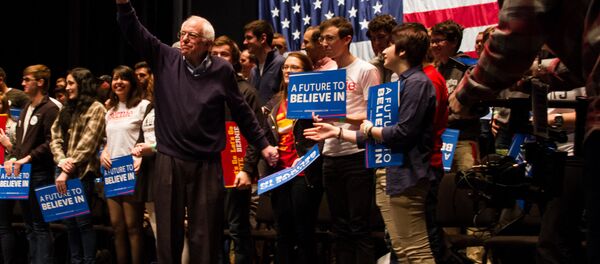Renowned — some would say infamous — for his time with the Weather Underground radical left-wing organization in the 1960s and 70s, Ayers believes that progressive movements can be the catalysts that help create a world designed for mutual benefit instead of exploitation.
"I’ve always felt that naming the political moment is the responsibility of radicals and revolutionaries and progressives" Ayers began, describing the thrust of his book.
"The idea is very simple and that is, that the discourse we have in this country about politics is a very anemic discourse, that we need to have more substance, more blood, more reality. And I also think that, for those of us on the left, we need not only to make a critique of what is, but we need to have in our minds a vision of what we’re fighting for."
Loud & Clear host Brian Becker pointed out that at the recent presidential debates, there was no mention of immigration or climate change, two prominent topics among progressives. Ayers said this was because an honest discussion of these and other critical topics would ultimately lead to a questioning of the capitalist economy in the United States.
Ayers pointed out that capitalism benefits only a small wealthy elite, but "it has no answer… for a decent living for human beings…it has no answer to [make] a world at peace, sustainable, democratic, participatory, transparent, it has no answers for that. So capitalism works for the capitalists, it doesn’t work for 99 percent of us and that’s becoming more and more apparent."
Ayer’s book is based on the phrase, "Be realistic, demand the impossible," suggesting that, for change to take place, the way people think about politics must shift profoundly.
"As long we live in politics as the art of the 'possible,'" he said, "we’re living in a world in which nothing fundamental can change for the better. So what I’m advocating is that we look at a world that could be, that is not yet. A possible world, and that is a socialist world."
He explained, "Socialism means the means of production owned by the people who work, and it means that’s it’s a worker’s society."
Becker noted the oft-repeated notion that the fall of the former Soviet Union signaled a final and decisive blow to socialism.
Ayers responded, "I think there’s a frantic attempt on the part of the capitalist class and the imperialist ruling class to demonize socialism and say that it never worked, and to quickly cover up whatever successes it might have."
"It’s a hopeless effort," he stated, "because we can point to and we can critique and analyze capitalism and imperialism and see that the horrors of the 20th century are the horrors of capitalism and its spawn. So I think that we have a big task in front of us to explain what socialism and freedom really look like."




